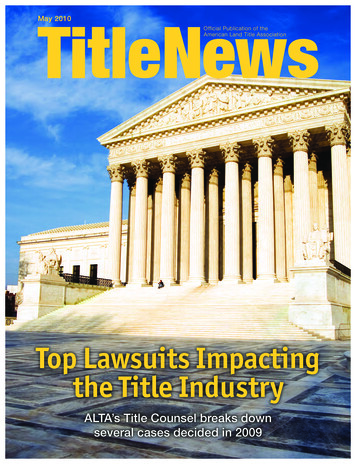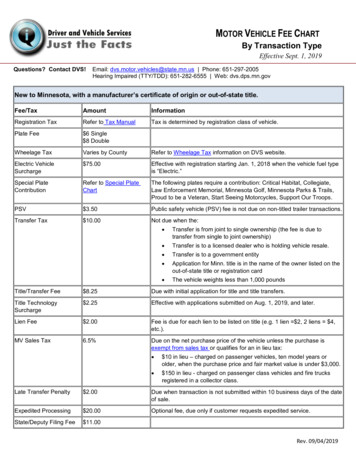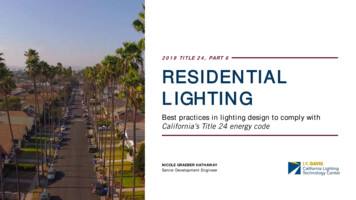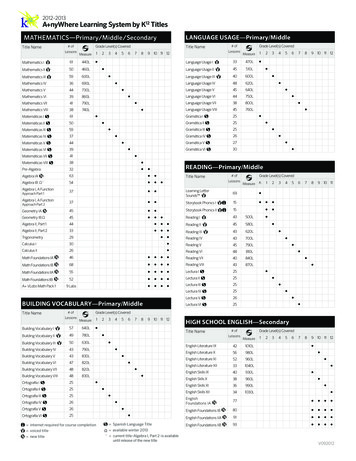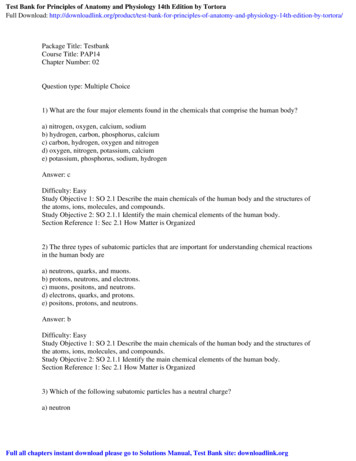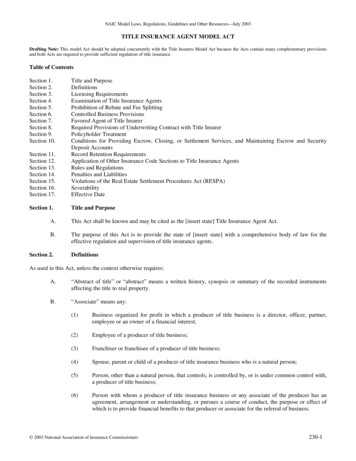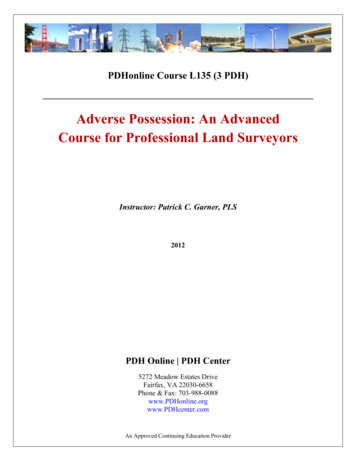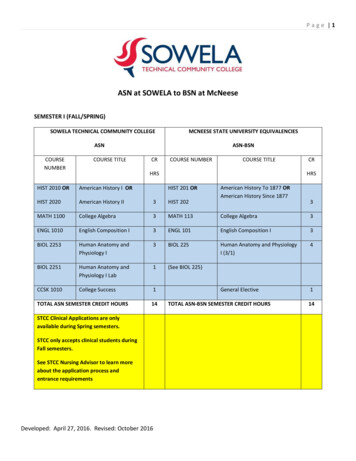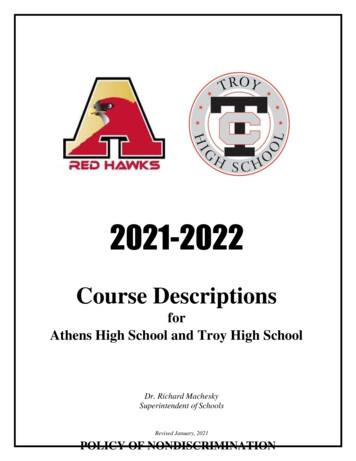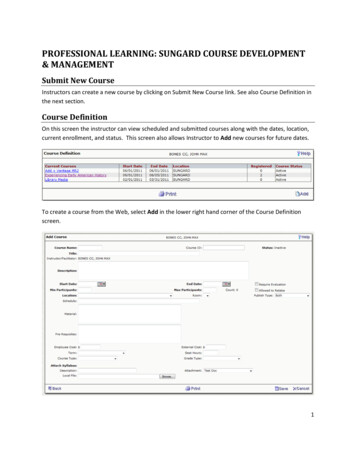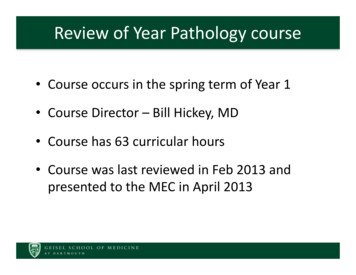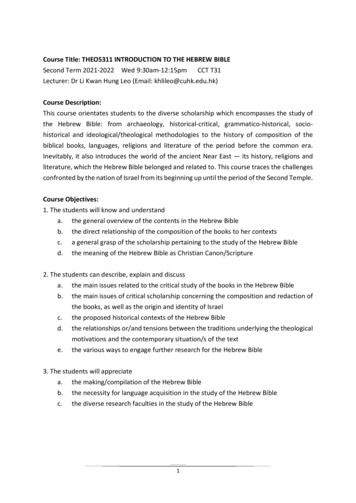
Transcription
Course Title: THEO5311 INTRODUCTION TO THE HEBREW BIBLESecond Term 2021-2022 Wed 9:30am-12:15pm CCT T31Lecturer: Dr Li Kwan Hung Leo (Email: khlileo@cuhk.edu.hk)Course Description:This course orientates students to the diverse scholarship which encompasses the study ofthe Hebrew Bible: from archaeology, historical-critical, grammatico-historical, sociohistorical and ideological/theological methodologies to the history of composition of thebiblical books, languages, religions and literature of the period before the common era.Inevitably, it also introduces the world of the ancient Near East — its history, religions andliterature, which the Hebrew Bible belonged and related to. This course traces the challengesconfronted by the nation of Israel from its beginning up until the period of the Second Temple.Course Objectives:1. The students will know and understanda. the general overview of the contents in the Hebrew Bibleb. the direct relationship of the composition of the books to her contextsc. a general grasp of the scholarship pertaining to the study of the Hebrew Bibled. the meaning of the Hebrew Bible as Christian Canon/Scripture2. The students can describe, explain and discussa. the main issues related to the critical study of the books in the Hebrew Bibleb. the main issues of critical scholarship concerning the composition and redaction ofthe books, as well as the origin and identity of Israelc. the proposed historical contexts of the Hebrew Bibled. the relationships or/and tensions between the traditions underlying the theologicalmotivations and the contemporary situation/s of the texte. the various ways to engage further research for the Hebrew Bible3. The students will appreciatea. the making/compilation of the Hebrew Bibleb. the necessity for language acquisition in the study of the Hebrew Biblec. the diverse research faculties in the study of the Hebrew Bible1
Course Requirements:1. Reading Assignment (10%)Either the English or Chinese version of Brueggemann Walter, An Introduction to the OldTestament: The Canon and Christian Imagination (Louisville, Ky.: Westminster John KnoxPress, 2003). You must track ALL your reading by filling in the Reading Log and submit themby 8 May 2022 by eLearn website/Blackboard.Failure to submit the Reading Log on time means no marks for this requirement.2. Reflection (30%)Write TWO reflection essays, each not less than 1500 (Eng)/2000 (Chi) words, and reflect on1. the Introduction/approach of our Textbook (10%)(Due Date: 9 Feb 2022)2. the Concluding Reflection of our Textbook and/or our course in general (10%)(Due Date: 20 April 2022)Each reflection should include the summary of what you have read/learnt (4 marks) andyour response (comments or questions) to what you have read/learnt and/or interactwith the content of the lectures and your readings (6 marks). You may submit theseassignments by eLearn website/Blackboard on or before the due date accordingly. If youneed to, only cite the bible references, BUT NOT the bible text itself. Marks will be heavilypenalized if you do not comply.3. Comments and discussion:(10%)This course requests each student to actively participate in class discussion through raisingAT LEAST THREE relevant questions or comments both on Brueggemann’s viewpoint inour textbook and contents during lectures. Using your learning in class to response topresent, real-life situation is highly recommended. Questions or comments must beverbally raised in class or posted in our social media group and/or course blogging cite. Itneeds to be submitted in writings at the end of the course together with the term paper,recording the date and questions raised and/or comments made.(Due Date: 8 May 2022)3. Exegetical Term Paper (60%)To facilitate your preparation and writing of the Exegetical Term Paper, the assignment willbe divided into 3 tasks and the marks distribution is as follow:Task 1 2: Paper proposal and Oral presentation (20%)Task 3: Exegetical Paper (40%)Task 1. Paper ProposalWrite 1 to 2 pages of proposal for your term paper. The following should be included:2
a.b.the proposed title and the thesis of the paper;preliminary: What critical issues associate with the Hebrew Bible you want to investigate?Why you want to explore in this area? Which passage(s) are you going to analyses? Whatis/are the reason(s) that you make such proposal and choose such Biblical text? What isyour intention to write such a paper?c. the research statement and/or question(s) [See class notes]d. What will be the methodology? Or what will be the interpretative approach used?e. an outline of your term paper (with appropriate explanatory notes) ;f. the expected result of the paper; andg. a preliminary book list (two or three books that you intended to read/consult).You are to submit your proposal to your lecturer at least 3 days before your oral presentation(see below). Marks will be given according to the degree of preparation (e.g. details of notesof explanation, delimitation of scope, expected difficulties, preliminary readings etc.). Sometopics for paper will be suggested during the classes; or you can consult the lecturer and/ortutor.Task 2. Oral presentationStudent is to make a presentation on his/her paper proposal individually or in group. Eachpresentation should NOT be more than 20 mins long and then open for class discussion. Theaim is to let the student orally present and test his/her idea in front of the others beforecommitting to his/her final draft. Marks will be given according to the clarity of the presentedcontent, the organization of the presentation, and the manner of the response to thediscussion questions.OPTION IF PRESENTATION CANNOT BE ARRANGED: Introductory EssayIn the case that the class size is too big and not every student can be arranged to have an oralpresentation, some students can opt for writing not less than 2000 words an *IntroductoryEssay*. Content of the essay should include a literature review on EITHER an introduction toa methodology approach to the studies of Hebrew Bible OR an introduction to the contentand critical issues of a biblical book. The essay is strongly suggested to be related to yourexegetical term paper. You are to submit it on 9 April 2022 by eLearn website/Blackboard.Task 3.Exegetical Term PaperWrite an Exegetical Term Paper not less than 4000 words (and if you opt for writing an introductoryessay, other than referring to this essay, no more than 10% of the content can be overlapped). Theformat of the Exegetical Term Paper has given in the paper proposal (task 1 of this assignment).Student should be able to analyze on the passage by different exegetical methods and to respond3
and comment to critical issues posted by scholars regarding to that passage and/or the biblical bookunder exploration. Marks will be distributed according to the following:1. Describe the Thesis and critical issue at hand2. Describe the exegetical method(s) used in the critical handling of the biblical passage3. Analyze the biblical passage critically.4. Relate the critical result to the scholarly discussion of the critical issues of the biblicalpassages/book (Brueggemann’s view in our textbook must be included)5. Construct implications of the ideas in the biblical passages/book critically and in a scholarlymanner.As a student enrolled in THEO5311 which is a course in post-graduate level, you are requiredto use what you have learnt in the identifying and solving of a research problem and give yourcomments and opinions on the research process. Description of content is necessary but notenough. You should demonstrate proper evidence-based reasoning in your works. Examplesin order to clarify the requirements will be demonstrated during the first few tutorials. Alsorefer to the marking rubric at the end of this outline.Paper MUST be submitted via the Webpage of the Chinese University Plagiarism IdentificationEngine VeriGuide: https://academic.veriguide.org/academic/login CUHK on 8 May 2022. Asoft copy should be post onto the BLACKBOARD and give a printout of receipt and signedAcademic Honesty Declaration Statement from VeriGuide (received via e-mail after you havesubmitted your assignment) to their tutors.NOTE: Attendance in lectures and tutorial are expected. Tutor will mark attendance for both.Less than 70% attendance is not accepted and will affect overall grade.ACADEMIC HONESTY AND PLAGIARISMAttention is drawn to University policy and regulations on honesty in academic work, and to the disciplinaryguidelines and procedures applicable to breaches of such policy and regulations. Details may be found athttp://www.cuhk.edu.hk/policy/academichonesty/ .With each assignment, students will be required to submit a signed declaration that they are aware ofthese policies, regulations, guidelines and procedures. For group projects, all students of the same groupshould be asked to sign the declaration.For assignments in the form of a computer-generated document that is principally text-based andsubmitted via VeriGuide, the statement, in the form of a receipt, will be issued by the system uponstudents’ uploading of the soft copy of the assignment. Assignments without the receipt will not be gradedby teachers. Only the final version of the assignment should be submitted via VeriGuide.4
Course Content and Schedule:The class will meet three periods each week for lectures and discussion. Occasional Tutorialwill be arranged.DateTopicsKey conceptsBasic ReadingsJan 12IntroductionCourse Introduction; Introduction: Imaginative Remembering;Literature and GenreTorah (1)Jan 19Introduction to TorahHebrew Bible as (Christian) ScriptureTorah (2)Jan 26Genesis; Exodus 1-18Myth, Legend and ANET/ArchaeologyJan 31-Feb 5Torah (4)Feb 16Brueg, Ch4-5Exodus 25-40, Leviticus, Number 1-10Brueg, Ch6-7Cult and Priestly schoolDue: Reflection Essay (1)Exodus 19-24, Numbers 11-36, DeuteronomyBrueg, Ch8-10Law and NarrativeProphets (1)Feb 23Introduction to the Prophets, Joshua, JudgesHistory and Deuteronomistic HistoryProphets (2)Mar 21 and 2 Samuel, 1 and 2 KingsBrueg, Ch11-13Brueg, Ch14-15Narrative and IdeologyProphets (3)Mar 9Isaiah, Jeremiah, EzekielLiterary Prophet and Their Social WorldProphets (4)Mar 16Minor ProphetsBrueg, Ch16-18Brueg, Ch19-21Twelve prophets as a bookWritings (1)Mar 23Introduction to the Writings, PsalmsBrueg, Ch22-23The Canonical Study of the PsalmsWritings (2)Mar 30Job, ProverbsBrueg, Ch24-25Wisdom LiteratureApr 1-Apr 9Apr 13Brueg, Ch3Lunar New Year PeriodTorah (3)Feb 9Brueg, Ch1-2Reading Week Due: Introductory EssayWritings (3)Five Scrolls, Ezra-NehemiahBrueg, Ch26,28Hebrew Bible and the early JudaismApr 20Writings (4)/Daniel, 1 and 2 ChroniclesConclusionInner Biblical Interpretation in Apocalyptic Literature and theBrueg, Ch27, 29-31Rewritten BibleDue: Reflection Essay (2)Concluding Reflection: Hiddenness of GodMay 8: Term Paper Due (including comments during class time and reading log)5
Brueg Brueggemann, Walter. An Introduction to the Old Testament: The Canon andChristian Imagination (Louisville, Ky.: Westminster John Knox Press, 2003). [CC-BS1140.3 .B782003] Second Edition, 2012. Chapters in the reading is according to 2nd �像》香港:天道,2012)The Old Testament: in English, preferred NRSV or NJB; in Chinese, preferred Revised UnionVersion.* Course material will be delivered via course webpage in http://Blackboard.cuhk.edu.hkOther Old Testament Introductory books:Recommended Books:Note: Drane’s book has a good list of books. Here are others and these are the ones youshould consult for your assignments:Bible Dictionary:Anchor Bible Dictionary (REF BS 440.A54 vols. 1-6)Ancient Near Eastern Texts:James Pritchard, Ancient Near Eastern Texts relating to Old Testament Translators andAnnotators (Princeton: Princeton University Press, 1969). (REF BS 1180.P83 1969)Hallo, William W. and K. Lawson Younger. The Context of Scripture: Canonical Compositions,Monumental Inscriptions and Archival Documents from the Biblical World (3vols. :Leiden; New York: Brill, 1997). (BS1180. C66 1997)Barton, John (ed.). The Biblical World. (2 vols.; London; New York: Routledge, 2002).Carr, David McLain, An Introduction to the Old Testament : sacred texts and imperial contextsof the Hebrew Bible (Chichester, West Sussex, U.K. ; Malden, MA : Wiley-Blackwell,2010). [CC -BS1130 .C37 2010]Coggins, R. J. Introducing the Old Testament (Oxford; New York: Oxford University Press,1992/2001). (BS 1140.2.C64 2001) check the new edition (2001).Collins, John C. Introduction to the Hebrew Bible (Minneapolis: Fortress Press, 2004).Coogan, Michael D. A Brief Introduction to the Old Testament: The Hebrew Bible in Its Context(New York/Oxford: Oxford University Press, 2009).Collins, John C. Introduction to the Hebrew Bible (Minneapolis: Fortress Press, 2004).Dell, Katherine. Opening the Old Testament (Oxford: Blackwell, 2008).6
John Drane, Introducing the Old Testament (Oxford: Lion Hudson plc, 2011, 3rd Ed.;Minneapolis: Fortress Press, 2011, 3rd Ed.) [CC -BS1140.3 .D73 新譯《舊約概論》北京:北京大學, 2004) [CC -BS1197 .D712 2004]Perdue, Leo (ed.). The Blackwell Companion to the Hebrew Bible (Oxford/Mass.: Blackwell,2001). [BS1171.3 .B53 2001]Raymond B. Dillard and Tremper Longman III, An introduction to the Old Testament (GrandRapids, Mich.: Zondervan, 1994). [CC -BS1140.2 .D55 良淑譯,《 21 ��[BS1140.2 .D55121999 ]Rendtorff, Rolf, The Old Testament: An Introduction (London: SCM Press, 1985). [BS1140.2.R3913]Series:Exploring the Old Testament (London: SPCK, 2003). [BS 1140.3.E97 2003]Commentaries:Anchor Bible Commentary,The New Interpreter’s Bible, New Century Bible, Hermenia, WordBiblical CommentaryChinese:李熾昌。《古經解讀 : 舊約經文的時代意義》香港 : (至公元前 586 界》北京:宗教文化出版社, ��約 《轉向:聖經 ��明道社,2010。Contact details for teacherLecturer Name:Dr. Li Kwan Hung LeoOffice Location:YCT The Course Outline will be subject to change due to class size and other circumstances;Please see the updated version via the course webpage in http://elearn.cuhk.edu.hk7
8
9
1. Reading Assignment (10%) Either the English or Chinese version of Brueggemann Walter, An Introduction to the Old Testament: The Canon and Christian Imagination (Louisville, Ky.: Westminster John Knox Press, 2003). You must track ALL your reading by filling in the Reading Log and s
